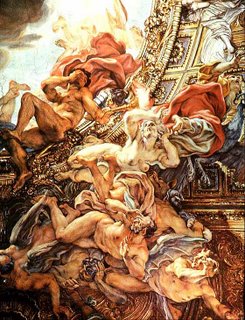The Cross of Christ Transforms. . . Our Lives
The scripture says, “No one who believes in him will be put to shame.” For there is no distinction between Jew and Greek; the same Lord is Lord of all and bestows his riches upon all who call upon him. For, “every one who calls upon the name of the Lord will be saved.” ROMANS 10:11–13
When a strong man, fully armed, guards his own palace, his goods are in peace; but when one stronger than he assails him and overcomes him, he takes away his armor in which he trusted, and divides his spoil. LUKE 11:21–22
Popular folklore holds that when the stock market crashed in 1929, many investors jumped out of windows to their deaths. The reality is that, of the few who did take their lives, most chose various other means. Yet the symbolic nature of those few “jumper” suicides was enough to leave a lasting impression upon a generation of people who saw that putting one’s trust in money is a dead-end street. The same can be said about those who put their trust in pleasure, whether that pleasure is derived from drugs or the abuse of sexuality. Deaths from overdoses and sexually transmitted diseases capture the popular imagination because they resonate with something deep in the human psyche: Although we are tempted to think that more money or pleasure can save us, deep down we know that placing one’s trust in them leads to death. Jesus compares this struggle to a battle. Our line of defense may be strong enough to repel some enemies, but they cannot protect us from the strongest opponent—death. Only Jesus promises immortality; only Jesus can deliver it. The false gods Bacchus, Venus, and Mammon may whisper empty promises into our ears, but they can never deliver.
Whom Do I Trust?
The bishop who was responsible for the conversion of St. Augustine said, “Faith means battles. If there are no contests, it is because there are none who desire to contend.” What Ambrose meant is that if we find our faith relatively easy, we should look again to see how much faith we really have. St. Peter Chrysologus said, “If you want to party with the Devil, you can’t celebrate with Christ.” In other words, you and I have to choose. Jesus told his disciples, “He who is not with me is against me, and he who does not gather with me scatters” (Matthew 12:30).
Stories of warrior saints abound. St. Padre Pio wrestled with the devil throughout the night. Similar tales are told of St. John Vianney. St. Francis and St. Benedict are both said to have waged great battles with the flesh. Whether the enemy was physical or spiritual, these holy men and women continued to fight—not by their own resources, but by acknowledging, like Paul, that “when I am weak, then I am strong” (2 Corinthians 12:10). Not one person who trusts in Jesus, says St. Paul, “will be put to shame”; what the Lord promises, he delivers.
Lukewarm Faith
I visited the ruins of Laodicea in 1979 while I was serving in Turkey as a member of the United States Army. Of all the seven churches mentioned in Revelation, the ruins of this city were the most desolate. It was destroyed late in the fifth century AD by a terrible earthquake. My memory is of a wide-open field, with an amphitheater and some graves nearby. In the Book of Revelation, Jesus warns the apathetic Church of Laodicea: “I know your works: . . . because you are lukewarm, and neither cold nor hot, I will spew you out of my mouth. For you say, I am rich, I have prospered, and I need nothing; not knowing that you are wretched, pitiable, poor, blind, and naked. Therefore I counsel you to buy from me gold refined by fire, that you may be rich, and white garments to clothe you and to keep the shame of your nakedness from being seen, and salve to anoint your eyes, that you may see. Those whom I love, I reprove and chasten; so be zealous and repent” (Revelation 3:15–19).
Archbishop Fulton J. Sheen, perhaps the greatest American Catholic preacher of the last century, used to say that these words were addressed especially to those of us who live in the northern hemisphere. When I look at the cross of Christ, I realize he’s right: The cross speaks of radical commitment; mine is only lukewarm by comparison. I often harbor thoughts about grasping at things of the world that might offer some guarantee against whatever impending doom lies in the future.
Who You Gonna Call?
I think it is understandable. We live in a consumer society that constantly tries to sell us a slice of heaven: “enough” life insurance, in case you should die suddenly; a “big enough” plot, so that your loved ones will be able to find you; the “right” drug to help you get more out of sex, enhance your mood, keep your kids in line; the list goes on and on. But in the end, will any of these enticing offers truly save us? Of course not. The cross of Christ forces us to choose sides, to reorder our priorities. It also transforms our personal crosses and gives us hope: We have on our side someone who is victorious over all enemies, all powers and principalities. St. Leonard said, “Impress on yourself this great truth: Even if all hell’s devils come after you to tempt you, you won’t sin unless you want to—provided that you don’t trust in your own powers, but in the assistance of God. He doesn’t refuse help to those who ask it with a lively faith.” God offers us all the help we need in this life, if we avail ourselves of it. As the catchy title tune of the movie Ghostbusters asks us: “Who ya gonna call?”



